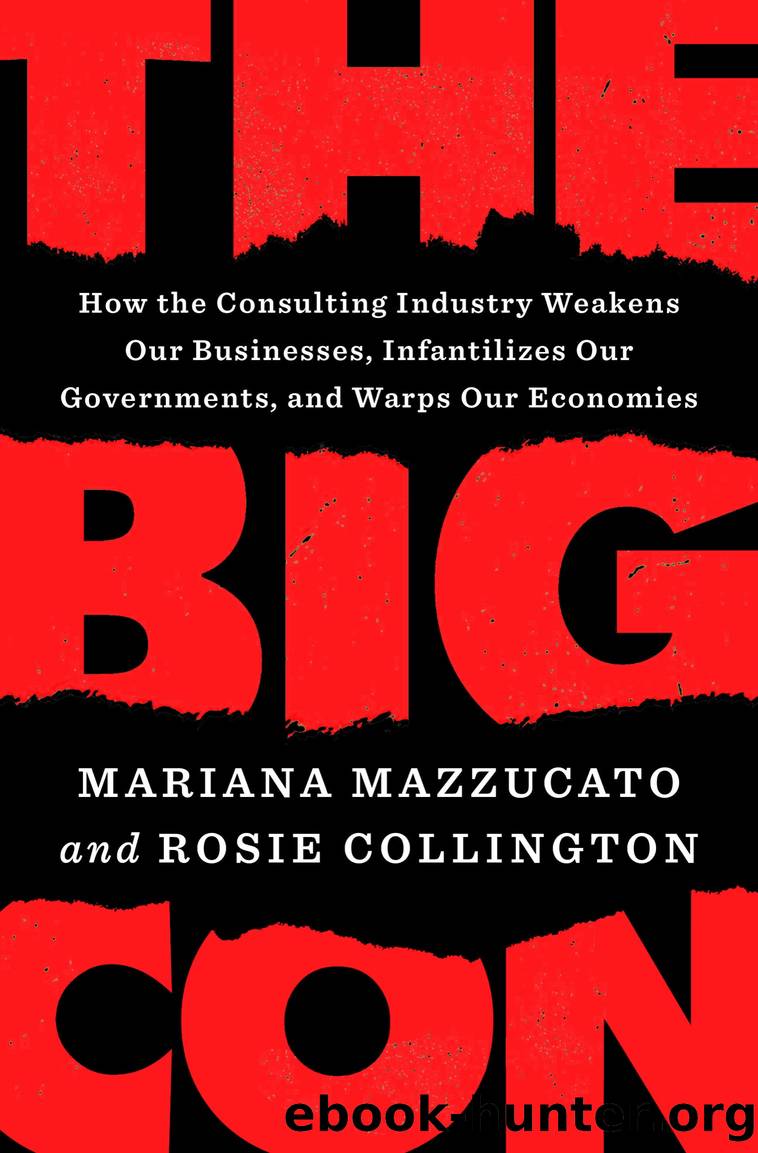The Big Con by Mariana Mazzucato;Rosie Collington; & Rosie Collington

Author:Mariana Mazzucato;Rosie Collington; & Rosie Collington [Mazzucato, Mariana & Collington, Rosie]
Language: eng
Format: epub
Publisher: Penguin Random House LLC
Published: 2023-03-07T00:00:00+00:00
Poachers and gamekeepers
Beyond the potential for political influence when consultancies serve âboth sides of the streetââgovernments (or international governance organizations) and marketsâthere is also a risk that consultancies use government knowledge and information in ways that benefit business clients and undermine legislation.
Such cases are usually only revealed later through newspaper investigations or special government inquiries. In the UK, the apparently duplicitous role of the Big Four in developing and then selling insights about new tax rules became the subject of a 2013 inquiry by the parliamentary Public Accounts Committee. The Committee found that Deloitte, Ernst & Young, KPMG and PricewaterhouseCoopers had all seconded staff to the Treasury to âprovide tax technical input and commercial experience.â In one complex and contested area of tax lawâtransfer pricingâthere were âfour times as many staff working for the four firms than for HMRC.â Transfer pricing is âa technique used by multinational corporations to shift profits out of the countries where they operate and into tax havens that involves a multinational selling itself goods and services at an artificially high price.â[28] If the consultancies wanted to shape the rules to a particular end, they were certainly in a good position to do so.[29]
The Public Accounts Committee was, however, less concerned about the Big Fourâs ability to influence tax rules through its involvement in drafting legislation than âby the way that the four firms appear to use their insider knowledge of legislation to sell clients advice on how to use those rules to pay less tax.â Its final report cited the example of KPMG, whose staff had been involved in developing âcontrolled foreign companyâ and âpatent boxâ rules at the Treasury. Those same employees had then returned to KPMG and produced marketing brochures for potential business clients that highlighted the role they had played in developing the law.[30] Responding to the findings, the Committeeâs chair, Labour MP Margaret Hodge, declared the actions of the Big Four âtantamount to a scam,â saying they represented a âridiculous conflict of interestâ and âpoacher turned gamekeeper turned poacher syndrome.â As a former consultant at Price Waterhouse herself, who built a ministerial career under the Blair governments, Hodge was in a better position than most to make this analysis.
Consulting companies do not need to second individuals or even secure contracts with governments to gain knowledge about policy processes and legislative changes that they can then offer to other clients. In some countries, they can simply employ a politician to work for them directlyâwhile that politician is still in office. This can also be an important avenue for influencing future contract decisions.
In many government bodies, including the British House of Commons, the European Parliament and the German Bundestag, there are no rules preventing Members of Parliament from also working for management consulting firms and other companiesâand many of them do so.[31] Historically, there have been high-profile instances of alleged conflict of interest resulting from politicians working simultaneously for a consulting company. In 2014, for example, the Conservative MP Stephen Dorrell was accused
Download
This site does not store any files on its server. We only index and link to content provided by other sites. Please contact the content providers to delete copyright contents if any and email us, we'll remove relevant links or contents immediately.
| ASVAB | GED |
| GRE | NCLEX |
| PRAXIS | SAT |
| See more | Flash Cards |
| Study Guides | Study Skills |
| Workbooks |
Talking to Strangers by Malcolm Gladwell(13347)
The Compound Effect by Darren Hardy(8943)
Tools of Titans by Timothy Ferriss(8365)
Wonder by R. J. Palacio(8097)
The Lover by Duras Marguerite(7893)
A Court of Wings and Ruin by Sarah J. Maas(7819)
The Circle by Dave Eggers(7104)
Deep Work by Cal Newport(7063)
Kaplan MCAT General Chemistry Review by Kaplan(6926)
To All the Boys I've Loved Before by Jenny Han(5839)
Wiseguy by Nicholas Pileggi(5769)
The Body: A Guide for Occupants by Bill Bryson(5080)
Eat That Frog! by Brian Tracy(4525)
1,001 ASVAB Practice Questions For Dummies by Powers Rod(4500)
Cracking the GRE Premium Edition with 6 Practice Tests, 2015 (Graduate School Test Preparation) by Princeton Review(4277)
Pre-Suasion: A Revolutionary Way to Influence and Persuade by Robert Cialdini(4220)
Barron's AP Biology by Goldberg M.S. Deborah T(4146)
ACT Math For Dummies by Zegarelli Mark(4043)
Alive: The Story of the Andes Survivors by Piers Paul Read(4018)
